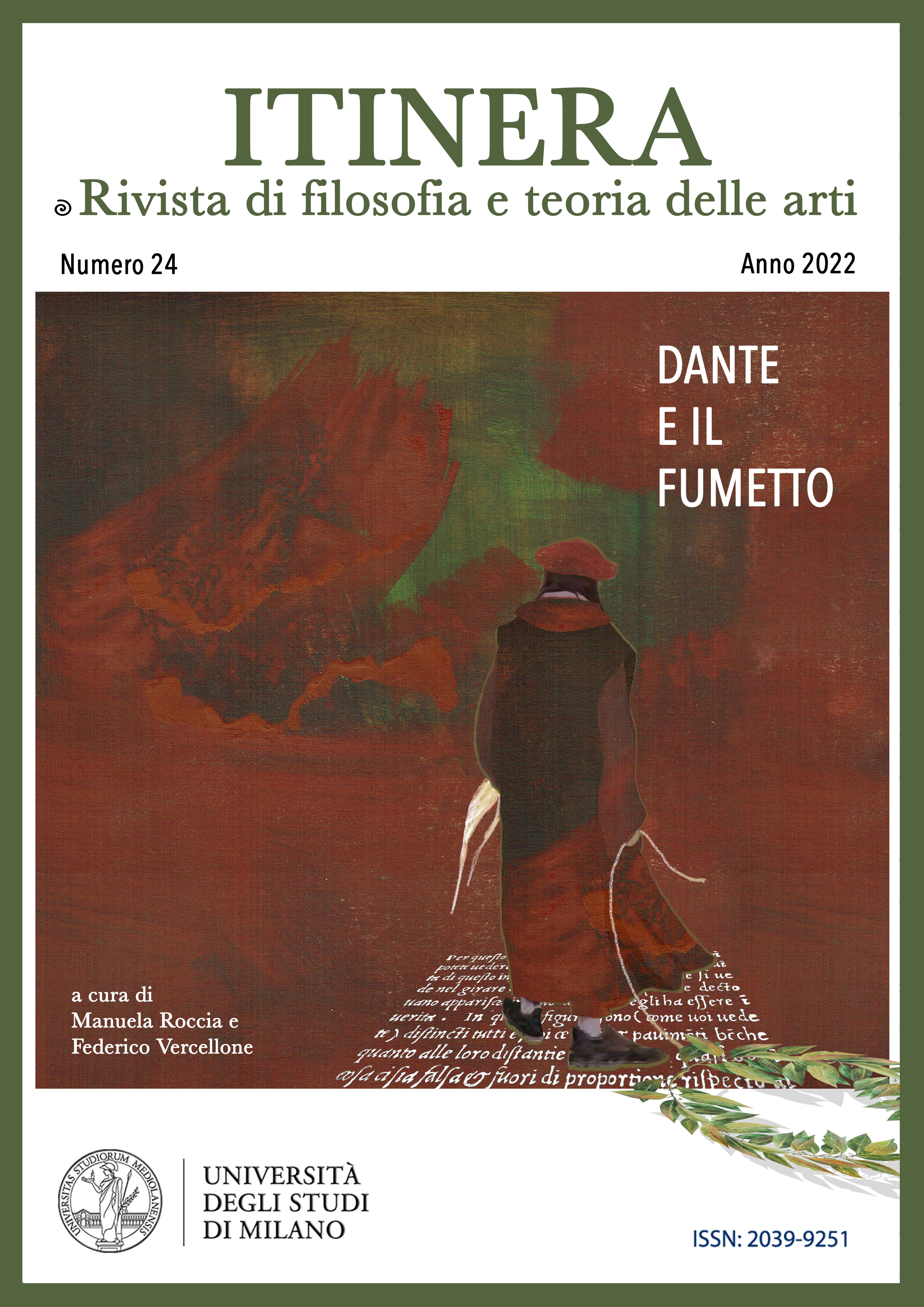«Auf dem Kopf gehen». Il discorso sulla follia nel Lenz di Georg Büchner
DOI:
https://doi.org/10.54103/2039-9251/19762Abstract
The essay aims to analyse Georg Büchner’s novel Lenz as a viable argument on madness that overturns the Cartesian perspective of Metaphysical Meditations. In the itinerary of the mind which leads the thinking subject to the self-understanding as res cogitans – the “still and immobile” starting point for understanding the idea of God and thus unravellling the doubt about the very existence of the world and of its own corporeity – Descartes excludes madness considering it what is – and must remain – extraneous to thought so that through the exercise of doubt it can reach reliable knowledge that regulates man’s existence in the world and allows him to get out of doubt as to whether the world is a dream that does not exist ‘outside’ the mind.
In this way, a human subject is outlined who does not know the suffering, nor does he experience the dramas of real existence, the fragility and vulnerability of finiteness. In the novel Lenz Büchner instead gives voice to a poet torn to the point of madness that suffers from doubt about the existence of God, of the world and of his own self. This leads to a discourse on madness as a pathological verse of human existence, a discourse that relates about the darkest parts of the human soul, that is, those eluding any clinical opposition between reason and madness and that represent, for this reason, an extraordinary trial for our main metaphysical categories.
Downloads
Riferimenti bibliografici
Blanchot, M., La conversazione infinita. Scritti sull’«insensato gioco di scrivere» (1969), a cura di G. Bottiroli, Einaudi, Torino 1977.
Borgards, R., Neumeyer, H. (a cura di), Büchner. Handbuch. Leben – Werk – Wirkung, J.B. Metzler, Stuttgart 2015.
Büchner, G., Cartesius (1833-1836), Holbach, Martigny 2020.
Büchner, G., Dichtungen, hrsg. von H. Poschmann, Deutscher Klassiker, Frankfurt a. M. 2006.
Büchner, G., Lenz. Text und Kommentar, Suhrkamp, Frankfurt a. M. 202010.
Büchner, G., Lenz (1839), a cura di G. Dolfini, Adelphi, Milano 1989.
Büchner, G., Lettere 1831-1837, a cura di A. Bürger Cori, Giometti&Antonello, Macerata 2021.
Büchner, G., Opere, a cura di M. Bistolfi, Mondadori, Milano 1999.
Büchner, G., Werke und Briefe, hrsg. von K. Pörnbacher, Deutscher Taschenbuch, München 1981.
Carnevale, R., «In carne e ossa»: il corpo nelle opere di Georg Büchner, Firenze University Press, Firenze 2009.
Cartesio, Meditazioni metafisiche (1641), a cura di L. Urbani Ulivi, Bompiani, Firenze-Milano 2017.
Celan, P., Il Meridiano. Discorso in occasione del conferimento del Premio Georg Büchner (1960), in Id., La verità della poesia. Il »Meridiano e altre prose«, a cura di G. Bevilacqua, Einaudi, Torino 2008, pp. 3-22.
Costazza, A., Il Lenz di Büchner: patografia letteraria del genio stürmeriano, in “Cultura tedesca”, 42/43, 2012, pp. 13-31.
Esposito, P., Cospira, Cronopio, Napoli 2022.
Fambrini, A., L’età del realismo. La letteratura tedesca dell’Ottocento, Carocci, Roma 2006.
Foucault, M., Storia della follia nell’età classica (19722), a cura di M. Galzigna, Bur, Milano 20155.
Furlani, S., Arte e realtà. L’estetica di Georg Büchner, Forum, Udine 2013.
Gammella, V., Foucault legge Cartesio. Metodo e soggettivazione nelle “Meditazioni metafisiche”, Laboratorio dell’ISPF, XI, 2014, pp. 1-32.
Latini, M., Il demone della montagna. A proposito della novella “Lenz” di Georg Büchner, in Pedone, G., Tedeschi, M., Genius loci, Mimesis, Milano 2017, pp. 201-215.
Mittner, L., Storia della letteratura tedesca. Dal realismo alla sperimentazione (1820-1970). Dal Biedermeier al fine secolo (1820-1890), Einaudi, Torino 1971, vol. III, t. primo.
Niccolini, E., Der Spaziergang des Schriftstellers. Lenz von Georg Büchner. Der Spaziergang von Robert Walser. Gehen von Thomas Bernhard, J.B. Metzler, Stuttgart-Weimar 2000.
Paduano, G., Follia e letteratura. Storia di un’affinità elettiva dal teatro di Dioniso al Novecento, Carocci, Roma 2018.
Piergiacomi, E., Pietrini, S. (a cura di), Büchner artista politico, Università degli Studi di Trento, Trento 2015.
Pilger, A., Die »idealistische Periode« in ihren Konsequenzen. Georg Büchners kritische Darstellung des Idealismus in der Erzählung „Lenz“, in “Georg Büchner Jahrbuch”, 8, 1995, pp. 104-125.
Rizzo, R., “Ich verlange in Allem – Leben, Möglichkeit des Daseins…“ La concezione dell’arte in Büchner e in Lenz, in Cercignani, F. (a cura di), Studia Büchneriana, Cisalpino, Milano 1990, pp. 125-155.
Schmidt, H., Melancholie und Landschaft. Die psychotische und ästhetische Struktur der Naturschilderungen in Georg Büchners „Lenz“, Springer, Wiesbaden 1994.
Thabet, S., Arte e follia tra Sette e Ottocento. Lo strano caso del dottor Büchner e del signor Lenz, Aracne, Roma 2017.
Vietta, S., Selbsterfahrung bei Büchner und Descartes, in “Deutsche Vierteljahrsschrift für Literaturwissenschaft und Geistesgeschichte”, 53 (3), 1979, pp. 417-428.
Dowloads
Pubblicato
Come citare
Fascicolo
Sezione
Licenza
Gli autori che pubblicano su questa rivista accettano le seguenti condizioni:
1. Gli autori mantengono i diritti sulla loro opera e cedono alla rivista il diritto di prima pubblicazione dell'opera, contemporaneamente licenziata sotto una Licenza Creative Commons - Attribuzione - Condividi allo stesso modo 4.0 internazionale che permette ad altri di condividere l'opera indicando la paternità intellettuale e la prima pubblicazione su questa rivista.
2. Gli autori possono aderire ad altri accordi di licenza non esclusiva per la distribuzione della versione dell'opera pubblicata (es. depositarla in un archivio istituzionale o pubblicarla in una monografia), a patto di indicare che la prima pubblicazione è avvenuta su questa rivista.
3. Gli autori possono diffondere la loro opera online (es. in repository istituzionali o nel loro sito web) prima e durante il processo di submission, poiché può portare a scambi produttivi e aumentare le citazioni dell'opera pubblicata (Vedi The Effect of Open Access).





